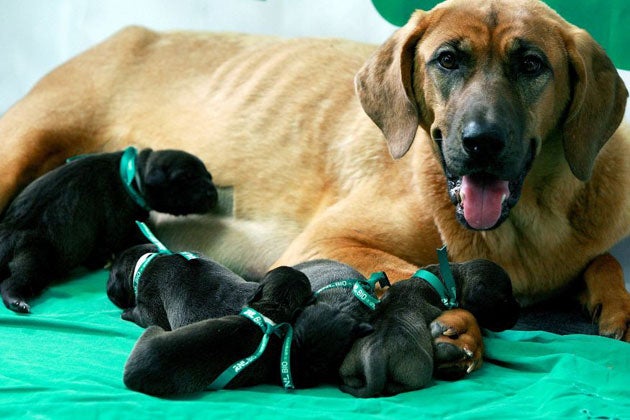Saved by a pit bull, Californian owner clones five more

Your support helps us to tell the story
From reproductive rights to climate change to Big Tech, The Independent is on the ground when the story is developing. Whether it's investigating the financials of Elon Musk's pro-Trump PAC or producing our latest documentary, 'The A Word', which shines a light on the American women fighting for reproductive rights, we know how important it is to parse out the facts from the messaging.
At such a critical moment in US history, we need reporters on the ground. Your donation allows us to keep sending journalists to speak to both sides of the story.
The Independent is trusted by Americans across the entire political spectrum. And unlike many other quality news outlets, we choose not to lock Americans out of our reporting and analysis with paywalls. We believe quality journalism should be available to everyone, paid for by those who can afford it.
Your support makes all the difference.A California woman who credits her now-deceased pit bull terrier, Booger, with saving her life is celebrating the birth of five clones of her former pet in a laboratory in South Korea.
"It is a miracle for me because I was able to smile again, laugh again and just feel alive again," Bernann McKinney declared at a news conference in Seoul yesterday to show off the week-old black puppies and help publicise what the company claims is the first successful commercial cloning of a pet dog.
Scientists at RNL Bio in Seoul said that the cloning of Booger, who succumbed to cancer two years ago, using tissue from an ear, means pet owners everywhere now have the chance to cling on to their four-legged friends beyond their natural deaths, or at least to very close replicas of them.
"As of today, we are at the stage of receiving orders from anywhere in the world," Ra Jeongchan, the company's chief executive, boasted. RNL embarked on the dog cloning project in co-operation with Seoul National University.
The rush of customers may not be instant, however, because the doggies in this laboratory window do not come cheap. When RNL first agreed to use cell tissue from Booger to try to recreate him, the company told Ms McKinney the fee would be $150,000 (£77,000).
She was subsequently given a discounted rate of $50,000 after she agreed to help publicise the birth of the Booger clones if all went as planned. She did not seem to be having any difficulty fulfilling her side of the bargain yesterday, gleefully hugging the pups for the cameras. "I had to make sacrifices and I dream of the day, some day when everyone can afford to clone their pet because losing a pet is a terrible, terrible loss to anyone," she said.
The company indicated that as the pace of pet cloning picks up, the cost will fall sharply. Although it is embroiled in a dispute with a competing US company over access to the cloning technology as well as the bragging rights for the first cloning of a domestic pet, RNL said it expects to clone at least 100 dogs next year.
Ms McKinney, 57, adopted Booger from a shelter 12 years ago. "I said, 'Get in the car, buddy, you're going home'. We forged a fast friendship," she recalled. "Little did I know that 30 days later this dog was going to save my life."
That was the day a much bigger dog attacked her so gravely she almost lost an arm. It would have been much worse, she said, but for Booger who dashed from the house to repel the other dog, allowing her to get in her car and drive, using her elbows to steer, to a neighbour for help.
As she recovered, Booger became her service dog, learning to pull shoes from her feet and even sort the laundry out of the dryer. "When Booger was dying, his eyes locked on mine," Ms McKinney said. "And he told me with his eyes, 'Don't be sad, because I am going to see you again." She would eventually come to sell her house to raise the money for the cloning that has given not one, but five new Boogers.
The team at RNL was led by Professor Lee Byeong-Chun, who played a leading role in the world's first ever cloning of a dog, called Snuppy. He is also a former associate of Hwang Woo-suk, the South Korean scientist who was disgraced after it emerged that research results on a human cloning project had been falsified.
The claim by RNL that it is the first to clone a pet purely for commercial, rather than research, reasons, was being contested by BioArts International, which has been using the services of Mr Hwang. It says RNL is illegally using patents on cloning technology that can be traced back to the Roslin Institute in Scotland, which conducted the first ever animal cloning with Dolly the sheep. "RNL has no right to offer this service and is practising black-market cloning," said Lou Hawthorne of BioArts.
As for the first-ever pooch cloning claim, Mr Hawthorne says that he is the proud owner already of three puppies cloned by his company from his mother's dog called Missy. Moreover, his company last month auctioned off five slots for pet cloning to owners in the United States. But no one at RNL was entertaining such counter-claims yesterday. As well as taking new orders for pet replications, the firm is also working with the South Korean customs office to clone dogs trained to sniff out explosives.
And there are always other animal species to consider. "For my next project, I will consider cloning camels for rich people in the Middle East," a jubilant Mr Ra suggested.
Join our commenting forum
Join thought-provoking conversations, follow other Independent readers and see their replies
Comments